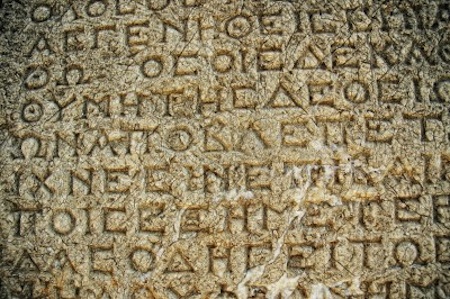On October 30th, 1938, a radio broadcast on the CBS Radio station "The War of…
How your family dinner can be like first century Jerusalem
Not long ago, as my family of six sat down to dinner, I had a bright idea. “Tonight is ‘no English’ night.” I said. The kids looked at me as if I’d grown an extra nose. “Any language but English during dinner,” I explained. “Let’s see what happens.”
What happened can only be described as chaotic. My husband and I spoke French and German, while the two older kids did pretty well in Spanish. The younger two chimed in with Swedish Chef and Wookie. We managed to pass the potatoes, but any attempt at meaningful dinner conversation was hopeless. After about five minutes, I cried uncle and begged them to speak English again.

So what were the languages of first century Jerusalem and how were they used? Historians and archeologists agree that there were four principal languages:
-
Hebrew
In the first century, Hebrew would have been used in the Temple, in synagogues, to read the law, and to pray. The Doctors of the Law would have taught in Hebrew, and many sayings and idioms of the common people would have been in Hebrew, much as we use Latin today to say carpe diem or et cetera.
-
Aramaic
Also a Semitic language, Aramaic was without doubt the everyday language of the Jews in the first century. It was, in fact, the predominant language of most of western Asia and Egypt.
-
Greek
Spoken throughout the Roman Empire, Greek was the language of the rich and powerful. It is likely that buying and selling in most of the cities of Judea was done in Greek, and anyone with any type of business or in any government office must have spoken it. Most people in the larger cities, even the poor, would have spoken at least a smattering of Greek.
-
Latin
Although it is true that the inscription on Jesus cross was written in Hebrew, Greek, and Latin, most scholars agree that Latin was little used in the Judean province. The occupying Romans—the everyday soldiers who kept the pax romana—may have spoken a variety of Latin among themselves, but Greek would have been the language used to communicate with their subjects and for administration of the province.
Just like at my dinner table, the mix of languages increased the potential for misunderstanding and did nothing to promote meaningful conversation among the many peoples of Jerusalem. No doubt language differences only heightened tensions in the first century city, especially between the Jews, Greeks, and the occupying Roman forces.
What languages do you speak or wish you could speak? What would your dinner table sound like on ‘no English’ night?

